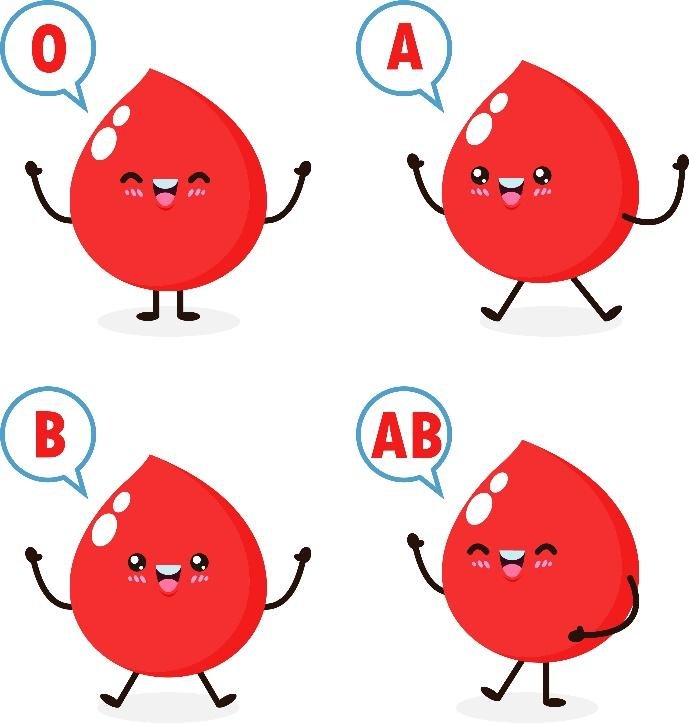Selecting Foods Based on Blood Type
Nature's Hearth Blog
Your Nourishing Kitchen
Select Your Favorite Farm Foods & Wild Harvest
&
Juice,
Blend,
Chop!
Making Meals with Traditional Foods
Adhering to the Principles of Holistic Health and WAPF Dietary Guidelines
Illustration by © Phanuchat Prasertpol | Dreamstime.com
Selecting Foods Based on Blood Type
Foods from five kingdoms of life, Animalia (animal products), Plantae (plants), Fungi (mushrooms), Protista (seaweeds), and Bacteria (probiotics), furnish us with the nutrients we need. Our inherited blood type may indicate which natural foods from the land and sea are optimal to eat and which are not. In his book, Live Right for Your Type, Peter J. D’Adamo, N.D. explains that when we eat foods containing lectins that are incompatible with our blood type, the lectins cause inflammation and interfere with physiological functions (D’Adamo, 2001, p. 48).
Drawing from decades of lab work and research with patients, Dr. Adamo discusses the critical role that secretor status plays in determining where blood type antigens are expressed in the body. Everyone carries blood type antigens on their blood cells, but most people (between 80 and 85 percent) have blood type antigens that move freely in the secretions, such as saliva. These people, he states, are the secretors. In contrast, non-secretors only have their blood type antigens present in the blood. Areas of health that may be controlled or influenced by secretor status may include (D’Adamo, 2001, pp. 6 – 8):
Beyond the significance of the lectins in foods, phytotoxins that are present in nutritious plant foods can cause health problems too. While fermented soy bean products, such as miso, offer health benefits, consuming soy may also result in unwelcome hormonal effects for some people. Phytic acid, naturally occurring in grains and legumes, interferes with mineral absorption; this can be diminished or neutralized by soaking, sprouting, and cooking. Cruciferous vegetables of the Brassica genus, such as broccoli, contain goitrogens which block the absorption of iodine needed by the thyroid; cooking can lessen this effect. The practice of selecting foods based on blood type and secretor status, as well as preparing foods traditionally, through fermenting, soaking, sprouting, and cooking, can bring relief from ailments and facilitate one’s path to health and vitality.
Foods from five kingdoms of life, Animalia (animal products), Plantae (plants), Fungi (mushrooms), Protista (seaweeds), and Bacteria (probiotics), furnish us with the nutrients we need. Our inherited blood type may indicate which natural foods from the land and sea are optimal to eat and which are not. In his book, Live Right for Your Type, Peter J. D’Adamo, N.D. explains that when we eat foods containing lectins that are incompatible with our blood type, the lectins cause inflammation and interfere with physiological functions (D’Adamo, 2001, p. 48).
Drawing from decades of lab work and research with patients, Dr. Adamo discusses the critical role that secretor status plays in determining where blood type antigens are expressed in the body. Everyone carries blood type antigens on their blood cells, but most people (between 80 and 85 percent) have blood type antigens that move freely in the secretions, such as saliva. These people, he states, are the secretors. In contrast, non-secretors only have their blood type antigens present in the blood. Areas of health that may be controlled or influenced by secretor status may include (D’Adamo, 2001, pp. 6 – 8):
- the degree to which foreign bacteria invade the system
- the adherence of lectins and other blood type-sensitive structures in food to digestive tissue
- syndrome X or Insulin Resistance Syndrome
- the balance of intestinal bacteria
- blood-clotting capabilities
Beyond the significance of the lectins in foods, phytotoxins that are present in nutritious plant foods can cause health problems too. While fermented soy bean products, such as miso, offer health benefits, consuming soy may also result in unwelcome hormonal effects for some people. Phytic acid, naturally occurring in grains and legumes, interferes with mineral absorption; this can be diminished or neutralized by soaking, sprouting, and cooking. Cruciferous vegetables of the Brassica genus, such as broccoli, contain goitrogens which block the absorption of iodine needed by the thyroid; cooking can lessen this effect. The practice of selecting foods based on blood type and secretor status, as well as preparing foods traditionally, through fermenting, soaking, sprouting, and cooking, can bring relief from ailments and facilitate one’s path to health and vitality.
References
D’Adamo, P. J. (2001). Live Right for Your Type. New York, NY: G. P. Putnam’s Sons.
Amy Wing, Holistic Health Educator,
Nature’s Hearth
Website: www.naturesheart.net
Email: ajw.habitat@gmail.com
Nutrition In a Nutshell, LLC © 2011 - 2023. All Rights Reserved.
